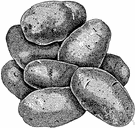spud
Also found in: Thesaurus, Medical, Acronyms, Idioms, Encyclopedia, Wikipedia.
spud
(spŭd)n.
1. Informal A potato.
2. A sharp spadelike tool used for rooting or digging out weeds.
3. A short section of pipe or a threaded fitting that completes a connection, as between a longer pipe and a nozzle, valve, or meter.
tr.v. spud·ded, spud·ding, spuds
1. To remove with a sharp spadelike tool.
2. To begin drilling operations on: spud an oil well.
[Middle English spudde, short knife.]
American Heritage® Dictionary of the English Language, Fifth Edition. Copyright © 2016 by Houghton Mifflin Harcourt Publishing Company. Published by Houghton Mifflin Harcourt Publishing Company. All rights reserved.
spud
(spʌd)n
1. (Plants) an informal word for potato1
2. (Tools) a narrow-bladed spade for cutting roots, digging up weeds, etc
3. (Tools) Also called: spudder a tool, resembling a chisel, for removing bark from trees
vb, spuds, spudding or spudded
4. (Agriculture) (tr) to remove (bark) or eradicate (weeds) with a spud
5. (Mining & Quarrying) (intr) to drill the first foot of an oil well
[C15 spudde short knife, of unknown origin; applied later to a digging tool, and hence to a potato]
Collins English Dictionary – Complete and Unabridged, 12th Edition 2014 © HarperCollins Publishers 1991, 1994, 1998, 2000, 2003, 2006, 2007, 2009, 2011, 2014
spud
(spʌd)n., v. spud•ded, spud•ding. n.
1. Informal. a potato.
2. a spadelike instrument, esp. one with a narrow blade, as for digging up or cutting the roots of weeds.
3. a stake for supporting dredging or earth-boring machinery.
4. a short pipe, as for connecting a water pipe with a meter.
v.t. 5. to remove with a spud.
[1425–75; late Middle English spudde short knife, of obscure orig.]
Random House Kernerman Webster's College Dictionary, © 2010 K Dictionaries Ltd. Copyright 2005, 1997, 1991 by Random House, Inc. All rights reserved.
spud
Past participle: spudded
Gerund: spudding
| Imperative |
|---|
| spud |
| spud |
Collins English Verb Tables © HarperCollins Publishers 2011
ThesaurusAntonymsRelated WordsSynonymsLegend:
Switch to new thesaurus
| Noun | 1. |  spud - an edible tuber native to South America; a staple food of Ireland spud - an edible tuber native to South America; a staple food of Irelandstarches - foodstuff rich in natural starch (especially potatoes, rice, bread) solanaceous vegetable - any of several fruits of plants of the family Solanaceae; especially of the genera Solanum, Capsicum, and Lycopersicon root vegetable - any of various fleshy edible underground roots or tubers baked potato - potato that has been cooked by baking it in an oven home fries, home-fried potatoes - sliced pieces of potato fried in a pan until brown and crisp jacket - the outer skin of a potato mashed potato - potato that has been peeled and boiled and then mashed Uruguay potato - similar to the common potato Solanum tuberosum, white potato, white potato vine, potato - annual native to South America having underground stolons bearing edible starchy tubers; widely cultivated as a garden vegetable; vines are poisonous |
| 2. | spud - a sharp hand shovel for digging out roots and weeds hand shovel - a shovel that is operated by hand | |
| Verb | 1. | spud - initiate drilling operations, as for petroleum; "The well was spudded in April" |
| 2. | spud - produce buds, branches, or germinate; "the potatoes sprouted" grow - increase in size by natural process; "Corn doesn't grow here"; "In these forests, mushrooms grow under the trees"; "her hair doesn't grow much anymore" germinate - cause to grow or sprout; "the plentiful rain germinated my plants" |
Based on WordNet 3.0, Farlex clipart collection. © 2003-2012 Princeton University, Farlex Inc.
Translations
Collins Spanish Dictionary - Complete and Unabridged 8th Edition 2005 © William Collins Sons & Co. Ltd. 1971, 1988 © HarperCollins Publishers 1992, 1993, 1996, 1997, 2000, 2003, 2005
Collins English/French Electronic Resource. © HarperCollins Publishers 2005
spud
Collins German Dictionary – Complete and Unabridged 7th Edition 2005. © William Collins Sons & Co. Ltd. 1980 © HarperCollins Publishers 1991, 1997, 1999, 2004, 2005, 2007
Collins Italian Dictionary 1st Edition © HarperCollins Publishers 1995